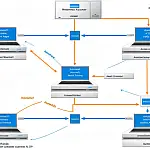How To Use Code Analysis to Analyse and Improve Your Code QualityCode analysis is a powerful tool to improve your code quality. Follow this guide to learn how to use it effectively and write better code.
Code analysis is a process of examining your code to identify potential issues and improve its overall quality. By using code analysis tools, you can catch errors, improve performance, and ensure that your code meets industry standards. In this guide, we'll explore how to use code analysis effectively to write better code.
Code analysis tools analyze your code and managed assemblies against a set of predefined rules and best practices, and provide feedback on areas that need improvement. Code analysis provides information about violations of the programming and design rules outlined in the Microsoft .NET Framework Design Guidelines. Warning messages to identify any relevant programming and design issues, bugs, security vulnerabilities, and performance problems. When it is possible, code analysis will supply information about how to resolve issues.
You can use the code analysis tools in Visual Studio to discover potential issues in your code, such as non-secure data access, usage violations, and design problems. The Code Analysis window is available in all editions of Visual Studio 2013.
Code Analysis is a static analysis tool which searches for common patterns which may indicate that something is wrong in the source code. For example, if an instance of a class which implements IDisposable is not disposed of properly, Code analysis will emit a warning:
private void DoSomething()
{
var connection = new SqlConnection(...);
this.ChangeSomeData(connection);
} This is the correct implementation of the previous piece of code:
private void DoSomething()
{
using (var connection = new SqlConnection(...))
{
this.ChangeSomeData(connection);
}
} Code Analysis is intended to find patterns which are cumbersome or simply boring to find manually. For instance, in the previous example, it may be quite boring for a developer to check if any class they use implements IDisposable or to remember all .NET Framework classes which implement it.
Although it is subject to false positives, it is usually beneficial to target zero warnings for business-critical code without using suppressions. Within Visual Studio, Code Analysis can be configured to run at compile-time; if project settings also specify that warnings should be treated as errors, violations of Code analysis rules won't stay unnoticed.
Since static analysis can take some time for medium or large projects, it is often a good idea to move it from the developer's machines to the TFS build server. While running Code analysis during pre-commit is not a good idea (unlike StyleCop), it can still run on build and fail it if warnings are found.
For non-business-critical code, Code analysis may be run manually from Visual Studio or the command line. The checks and warnings can be fine-grained in project properties to suit your needs. For instance, globalization warnings can be turned off if your project is not intended to be localized.
As with StyleCop, it is essential to decide whether the project will target zero warnings from Code analysis from the beginning of the project. Introducing it in an existing project may be too painful.
After running your code analysis tool, it's important to carefully review the results and address any issues that are identified. This may involve refactoring code, fixing bugs, or making other changes to improve the quality of your codebase. It's important to prioritize the issues identified by the tool based on their severity and impact on your code. Some issues may be minor and can be addressed quickly, while others may require more significant changes to your code. By regularly analyzing and addressing the results of your code analysis, you can improve the overall quality and maintainability of your codebase.
By regularly running code analysis on your code, you can catch potential problems early and improve the overall quality of your codebase.









